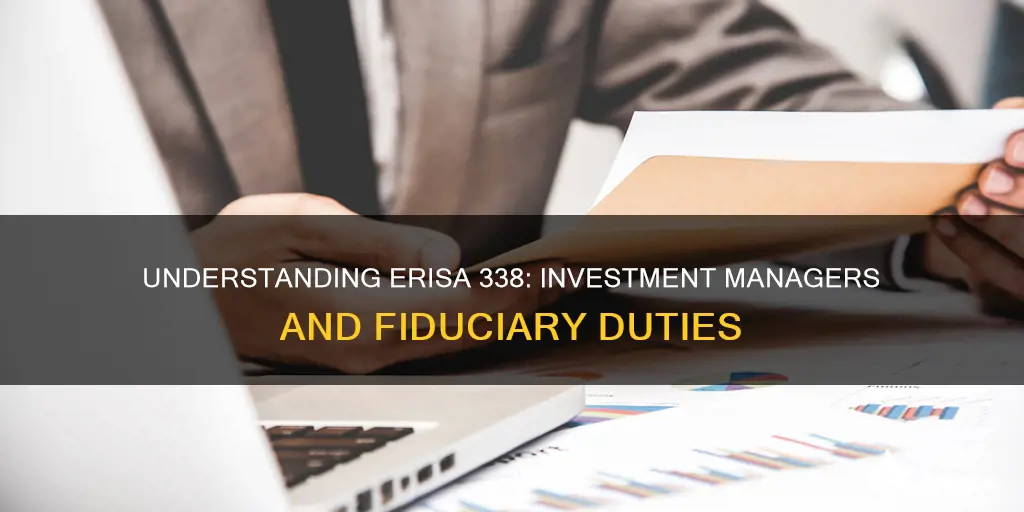
An ERISA 3(38) Investment Manager is a codified investment fiduciary on a retirement plan as defined by ERISA (the Employee Retirement Income Security Act) section 3(38). The 3(38) investment manager is responsible for selecting, managing, monitoring, and benchmarking the investment offerings of the plan. They have discretionary authority to direct the investment of funds and are the sole decision-makers for investment selection and monitoring. The employer, or plan sponsor, relinquishes discretion and influence in roster decisions but monitors the work of the advisor to ensure alignment with the advisory agreement and investment policy of the plan. The 3(38) investment manager assumes sole fiduciary liability for investment selection and monitoring, limiting the liability of the plan sponsor.
What You'll Learn
- ERISA 3(38) investment managers have discretionary controls over the plan's assets
- They can select, monitor, and replace investments
- They must be a registered investment advisor, bank, or insurance company
- The plan sponsor is still responsible for prudently selecting and monitoring the investment manager
- Hiring an ERISA 3(38) investment manager can reduce fiduciary liability

ERISA 3(38) investment managers have discretionary controls over the plan's assets
The Employee Retirement Income Security Act (ERISA) requires plan sponsors to act prudently when making decisions relating to the management or administration of the plan. These "fiduciary functions" must be performed solely in the interests of plan participants and beneficiaries, with the exclusive purpose of providing benefits, while also defraying reasonable expenses.
An ERISA 3(38) investment manager is a fiduciary who has been appointed to have full discretionary authority and control to make actual investment decisions. The manager may select, monitor, remove, and replace the investment options offered under the plan. The 3(38) investment manager has full fiduciary responsibility for their investment decisions, subject to the terms of the plan documents and their investment policy statement.
The plan sponsor signs over authority to the 3(38) fiduciary to make all investment decisions. The 3(38) fiduciary assumes legal responsibility and liability for the decisions it makes. The plan sponsor is still responsible for the prudent selection of the 3(38) investment manager and must monitor and benchmark that 3(38) investment manager.
The 3(38) investment manager is responsible for the selection, monitoring, and replacement of investment options as needed. They will often act as a plan consultant by helping to manage other providers, as well as provide financial education. They assume a complete investment fiduciary stance as recognized by ERISA. They must acknowledge this status in writing and have a written agreement with the plan sponsor.
The 3(38) investment manager has discretionary controls over the plan's assets. They select, monitor, and make all investment decisions. The plan sponsor is informed before any changes are made. The 3(38) investment manager is for plan sponsors that don't have the time or desire to be responsible for the plan's investments.
Building a Model Investment Portfolio: A Comprehensive Guide
You may want to see also

They can select, monitor, and replace investments
ERISA 3(38) investment managers are fiduciaries who have the important role of managing plan investments for another fiduciary. They are responsible for selecting, monitoring, and replacing investments, and have the power to make decisions about the investment of plan assets.
The role of an ERISA 3(38) investment manager is to act as a co-fiduciary to the plan trustee, taking on the responsibility and liability for managing the plan's investments. This means they have significant control and discretion over the investment of plan assets. The 3(38) investment manager can make decisions about the investment policy and strategy, and has the power to buy, sell, and trade investments on behalf of the plan.
In terms of selecting investments, an ERISA 3(38) investment manager will typically construct an investment menu or policy that outlines the types of investments that can be made. This will involve researching and analysing different investment options, and selecting those that align with the risk profile and objectives of the plan. The 3(38) investment manager will consider factors such as diversification, liquidity, and expected returns when constructing the investment menu.
Monitoring and replacing investments is also a key part of the role. ERISA 3(38) investment managers must regularly review the performance of investments to ensure they are meeting expectations and adhering to the investment policy. This involves evaluating the risk and return of each investment and making any necessary adjustments to the portfolio. If an investment is underperforming or no longer aligns with the plan's objectives, the 3(38) investment manager has the discretion to replace it with a more suitable option.
The ERISA 3(38) investment manager must act in the best interests of the plan participants and beneficiaries at all times. This includes making prudent and thoughtful investment decisions and ensuring that the investment strategy is appropriately diversified and aligned with the plan's objectives. By delegating these responsibilities to an ERISA 3(38) investment manager, the plan trustee can benefit from the expertise and investment management skills of a specialist fiduciary.
College Savings vs Investments: Where Should Your Money Go?
You may want to see also

They must be a registered investment advisor, bank, or insurance company
An ERISA 3(38) Investment Manager is a codified investment fiduciary on a retirement plan as defined by ERISA section 3(38). They are responsible for selecting, managing, monitoring, and benchmarking the investment offerings of the plan.
The 38th definition in the act (ERISA Section 3(38)) is the definition of investment manager. An investment manager is a special type of fiduciary with full discretionary authority and control to make actual investment decisions. The manager may select, monitor, remove, and replace the investment options offered under the plan.
Only certain types of financial institutions may be appointed as a 3(38) investment manager. They must be a registered investment advisor, bank, or insurance company and must acknowledge their fiduciary status in writing. It is important that service agreements are carefully drafted to provide for both the appointment of a 3(38) and the acknowledgement of fiduciary status.
A 3(38) investment manager must be a registered investment advisor, bank, or insurance company because of the increased responsibility they carry. They have the power to manage, acquire, or dispose of any asset of the plan. As such, they are held to a higher standard than other fiduciaries.
By outsourcing the role of 3(38) investment manager, employers can dramatically reduce their work and costs associated with a 401(k) plan. An effective investment manager will ensure that investment lineups are cost-effective, prudent, diversified, and competitive.
The Cycle of Savings, Borrowing, and Investing: Understanding the Trio
You may want to see also

The plan sponsor is still responsible for prudently selecting and monitoring the investment manager
An ERISA 3(38) Investment Manager is a codified investment fiduciary on a retirement plan as defined by ERISA section 3(38). The 3(38) investment manager assumes sole fiduciary liability for investment selection and monitoring. They are responsible for selecting, managing, monitoring, and benchmarking the investment offerings of the plan.
The plan sponsor must ensure that the investment manager is actually performing the services they are hired to perform. The sponsor must also ensure that the investment manager is qualified to meet their fiduciary obligations under ERISA. An investment manager’s ERISA qualifications are even more important than investment experience or past performance.
The plan sponsor must also ensure that the investment manager is providing a service that is in line with the advisory agreement and investment policy of the 401(k) plan. The investment manager should make this easy by providing regular reports, often quarterly, of all that is occurring and any changes being made.
Strategies to Recover from a Drop in Your Investment Portfolio
You may want to see also

Hiring an ERISA 3(38) investment manager can reduce fiduciary liability
The Employee Retirement Income Security Act (ERISA) outlines the rules and responsibilities that plan sponsors and administrators must follow to act in the best interest of the plan and its participants. When it comes to fiduciary roles, there are three main types: 3(16), 3(21), and 3(38). Each of these roles has distinct duties and liabilities associated with them.
The focus of 3(21) and 3(38) investment fiduciaries is on providing investment recommendations. A 3(21) investment fiduciary, also known as an investment advisor, shares co-fiduciary responsibility with the plan administrator and can provide investment advice. However, they must wait for approval from the client or plan sponsor before executing any investments. This means that the plan sponsor retains ultimate decision-making power and is not relieved of fiduciary liability for selecting and monitoring the plan's investments.
On the other hand, hiring an ERISA 3(38) investment manager can reduce fiduciary liability for the plan sponsor. A 3(38) investment manager is a codified investment fiduciary on a retirement plan, as defined by ERISA Section 3(38). They have discretionary authority and are responsible for selecting, managing, monitoring, and benchmarking the investment offerings of the plan. Unlike a 3(21) fiduciary, a 3(38) investment manager can make investment decisions on behalf of the client without requiring approval.
By delegating control of a 401(k) plan's investment lineup to an ERISA 3(38) investment manager, the employer or plan sponsor can minimise their liability for poor investment selection and monitoring decisions. The 3(38) investment manager assumes sole fiduciary liability for investment selection and monitoring, providing greater protection to the plan sponsor from claims related to poor investment choices.
It is important to note that the plan sponsor is still responsible for prudently selecting and monitoring the 3(38) investment manager. The sponsor must carefully choose the manager, considering their qualifications, expertise in retirement plan rules, and other relevant factors. Additionally, the plan sponsor should ensure that the 3(38) investment manager follows an Investment Policy Statement prepared in consultation with the plan administrator or trustee.
In summary, hiring an ERISA 3(38) investment manager can reduce fiduciary liability for plan sponsors by delegating investment decision-making authority. This not only provides protection from claims related to poor investment choices but also saves time, energy, and internal costs associated with managing the investment roster.
Active Investment Managers: Strategies and Secrets Unveiled
You may want to see also
Frequently asked questions
An ERISA 3(38) Investment Manager is a codified investment fiduciary on a retirement plan as defined by ERISA section 3(38).
An ERISA 3(38) Investment Manager is responsible for selecting, managing, monitoring, and benchmarking the investment offerings of a retirement plan. They have discretionary controls of the plan's assets and can select, monitor, and replace investments without approval from the client.
Hiring an ERISA 3(38) Investment Manager can reduce the cost, risk, and work associated with sponsoring an employee retirement plan. It also helps the client focus on their business by offloading administrative tasks and investment-related legwork.
An ERISA 3(38) Investment Manager must be a registered investment adviser under federal or state law, a bank, or an insurance company. They must also acknowledge their fiduciary status in writing.







